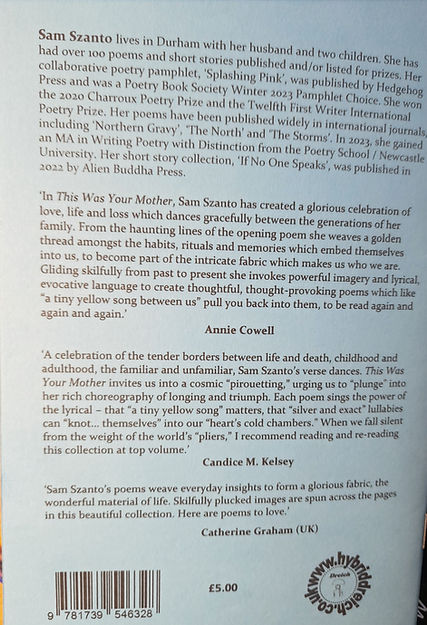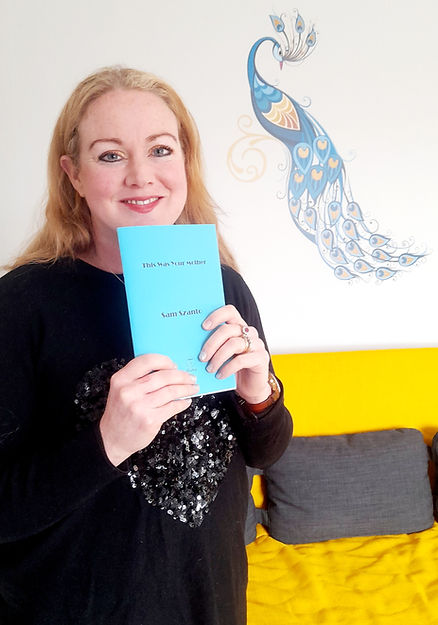20 Questions with... Roger DeBlanck
- samszanto2
- Sep 11, 2023
- 5 min read

Roger DeBlanck is the author of seven books: four novels and three works of poetry and nonfiction. He has a bachelor’s degree in English and a master’s degree in Information Science. Roger works as a librarian in a large public library in Las Vegas. He lives with his wife Alley and dog Sophy in Henderson, Nevada.
Website: rogerdeblanck.com Roger can be contacted on Goodreads, Instagram, Facebook, Threads, LinkedIn, and Twitter: see his website for links.
1. Please introduce yourself. Where are you from? What was your life like growing up?
Hello, my name is Roger DeBlanck (last name pronounced like the actor Matt LeBlanc, except my last name starts with “D” and ends with “ck”). I was born and raised in the Las Vegas Valley, and I love Southern Nevada and continue to make my home there. Growing up, I thrived on the competition of athletics and sports, while I also developed my lifelong commitment to books, reading, and literature. My first timid attempts at writing started in elementary school with poetry. By high school, as I played the big three (football, basketball, and baseball), I was the odd teammate who hyped up for games not by zoning out to music on headphones, but by silently reciting to myself soliloquies from Shakespeare or passages from Thoreau’s Walden to gain focus before taking the field, court, or mound.
2. Did you always want to be a writer? If you also work, what do you do / did you do?
I’ve always needed to write, but not until the end of high school when I was moving on from sports did I start to envision writing books someday. As an English major, I immersed in language, literature, and writing, and during my college years I began to compose more serious poetry and prose. I have a “career” as a librarian, which has been a perfect job and environment to nurture my writing.

3. Tell us about your most recently published work in a sentence.
The Hummingbird Diary is a collection of poems where the idea of the hummingbird symbolizes movement and energy whether in activism to pursue justice or in personal beliefs to engage with lifelong learning.
4. What are you working on right now?
For my next project, I’m envisioning a historical novel involving Malcolm X and Martin Luther King Jr.
5. Do you have a writing routine, and if so what is it?
My writing routine always begins with lots and lots of reading. Once immersed in the work of my favorite writers, my ideas begin to generate.
6. Where do you write—always in the same space, or different places? Can you write ‘on the move’?
Most of my writing occurs in my “office/home library” surrounded by my wall of books and by posters of Toni Morrison, Shakespeare, Albert Camus, JFK & Jackie, U2, and Nine Inch Nails. Once I begin a project, however, I can work on it anytime and anyplace.
7. What advice do you have for other authors who are starting out? What is the best advice you’ve heard?
I consider myself a reader first and foremost, and my writing mantra and advice to other authors is this: Read as much as you can and read as often as you can. Make your reading goals more important than your writing goals. The best advice I’ve heard is from the great Irish poet Seamus Heaney: he says writing requires getting started, keeping going, and getting started again. I cherish Heaney’s sage advice.
8. Do you enjoy doing live readings or are they a necessary evil—or somewhere in between?
Live readings can be incredibly gratifying, so I mostly look forward to sharing my work when an opportunity arises, but the anxiety of wondering whether I’m connecting with anyone can leave me feeling like I failed.
9. Are there recurring themes in your work? Where do you feel these emanate from if so?
Whether in my novels, poetry, or essays, you’ll probably recognize themes of seeking and journeying, suffering and surviving, enduring and overcoming, compassion and forgiveness, and always hope although never a coda of absolute certainty. My favorite writers/thinkers (listed below) have inspired my works and the themes in them.
10. Should writers have a moral purpose? What is the purpose of a writer in today’s society?
Writers should have a “moral” purpose to expose, confront, and reject all that is wrong in the world, while also honoring and idealizing what is right. Writers should have a purpose to address a careful and thoughtful understanding of the most basic truths about the world: that it is a place both shamefully flawed and overwhelmingly beautiful. Writers should have a purpose to recreate creation and to imagine the world as the place it ought to be.
11. Do you write between genres or not?
I toggle back and forth between writing literary historical novels and poetry. I’ve also written essays on religion, history, and contemporary society. I’m also an avid book reviewer, having written 792 reviews on Goodreads as of today when answering these questions.
12. Which living writers do you most admire?
Teju Cole, Elizabeth Gilbert, Michael Ondaatje, Colson Whitehead, Julie Orringer, Edwidge Danticat, J.M. Coetzee, Ibram X. Kendi, Viet Thanh Nguyen, Mustafa Akyol, Reza Aslan, Margaret Atwood, Clint Smith, Ta-Nehisi Coates, Adam Johnson, Jesmyn Ward, Ha Jin, Andrew Sean Greer, Tim O’Brien, Douglas Stuart, Sharon Olds, Joy Harjo, Ada Limón, Naomi Shihab Nye, Damon Galgut, Jay Parini,
13. Which dead writers do you most admire?
It’s been heartrending to see my three favorite writers pass away in the last five years: Philip Roth (2018), Toni Morrison (2019), and Cormac McCarthy (2023). Other classic writers I revere: Albert Camus, Jorge Luis Borges, Naguib Mahfouz, Kahlil Gibran, Hermann Hesse, Fyodor Dostoevsky, John Steinbeck, Henry David Thoreau, Shakespeare, Seamus Heaney, Pablo Neruda, Carl Sandburg, Langston Hughes, Wislawa Szymborska, Mary Oliver, Octavio Paz, Derek Walcott
14. What’s the book you wish you’d written?
Beloved by Toni Morrison
15. What other external influences do you have: nature/place, music etc?
The beach and the ocean. Music and movies.
16. Do you suffer from ‘writer’s block’ and how do you overcome it if so?
Writer’s block has never been an obstacle for me. I’m a reader first and foremost, and my commitment to writing book reviews keeps my mind active with critical thinking and my ideas constantly generating.
17. What’s been your favourite reaction to your writing?
Someone telling me that I opened their eyes and changed their mind.
18. How do your family and friends feel about your writing?
They’re incredibly supportive.
19. Do you have a favourite bookshop?
I work in a large public library in Las Vegas, and we have a very cool used bookshop inside the library!
20. How do you see the future of writing? Will we become more or less dependent on Amazon?
I’m concerned too many writers are not readers first and foremost, and that failure to love reading is hurting the quality of writing. Amazon is vital for writers now and in the future, and I like many aspects of what Amazon enables, while other aspects annoy and frustrate me.










Comments